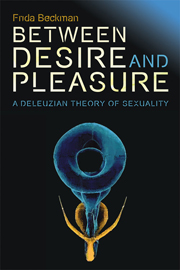Book contents
- Frontmatter
- Contents
- Preface
- Introduction: The Body without Orgasm
- 1 A Nonlinear History of Sexuality: Deleuze with Foucault
- 2 Psychoanalysis Unhinged: Deleuze with Lacan, Klein and Reich
- 3 Folding, Individuation and the Pleasurable Body
- 4 Orgasmic Feminism
- 5 Disabling Sex: Inventing a People who are Missing
- 6 Becoming-Animal and the Posthuman Orgasm
- 7 Capitalism and Sexuality
- Epilogue: Swedish Sin, or the Importance of Remaining Curious
- Bibliography
- Index
5 - Disabling Sex: Inventing a People who are Missing
Published online by Cambridge University Press: 05 October 2013
- Frontmatter
- Contents
- Preface
- Introduction: The Body without Orgasm
- 1 A Nonlinear History of Sexuality: Deleuze with Foucault
- 2 Psychoanalysis Unhinged: Deleuze with Lacan, Klein and Reich
- 3 Folding, Individuation and the Pleasurable Body
- 4 Orgasmic Feminism
- 5 Disabling Sex: Inventing a People who are Missing
- 6 Becoming-Animal and the Posthuman Orgasm
- 7 Capitalism and Sexuality
- Epilogue: Swedish Sin, or the Importance of Remaining Curious
- Bibliography
- Index
Summary
What health would be sufficient to liberate life wherever it is imprisoned by and within man, by and within organisms and genera?
(Deleuze 1997: 3)Introduction
Deleuze's philosophy is intently preoccupied with the production that emerges through the collapse of the traditionally functional. The straight routes of the sea merchant, the unified subject and the organisation of the body called the organism all, in different ways, symbolise the stratification of desire and thereby the delimitation of becoming. Deleuze regards functionality through the lens of the social and political theft of the force of the body – the enforced organisation of matter according to transcendent principles of utility. The striated, as he notes with Guattari, produces distinct order and form and thereby fixes the variable into points between which the trajectory is set. The smooth, on the other hand, is about a connective desire that couples forces and enables unnatural participations. Unlike the fixed organisation of the striated, the smooth is about the explosion and reinvention of forms by the force of becoming inherent in all matter. The smooth is ‘continuous variation, continuous development of form’ (Deleuze and Guattari 2004: 528). Thus literature, for example, should not be about imposing a predetermined form on matter, but should move ‘in the direction of the ill-formed or the incomplete’ (Deleuze 1997: 1).
- Type
- Chapter
- Information
- Between Desire and PleasureA Deleuzian Theory of Sexuality, pp. 98 - 119Publisher: Edinburgh University PressPrint publication year: 2013



